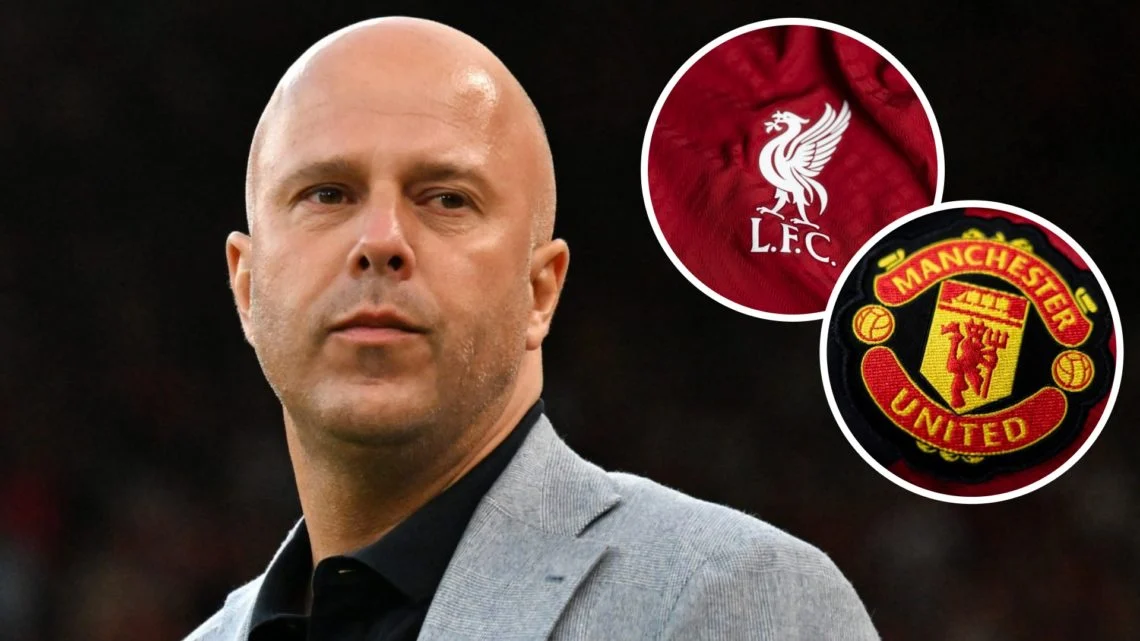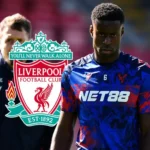Liverpool join Man United in race to sign £23m Premier League centre-back who’s a ‘born leader’

Liverpool Football Club finds itself at a fascinating crossroads in the summer of 2025. Under the stewardship of new manager Arne Slot, the Reds are embarking on a carefully orchestrated reconstruction project that seeks to address the defensive vulnerabilities that have plagued the team throughout the pre-season and into their Premier League opener. The pursuit of defensive reinforcements has become a central theme of Liverpool’s transfer window, with two Premier League center-backs emerging as primary targets: Crystal Palace’s Marc Guehi and Brentford’s Nathan Collins.
This transfer saga represents more than just the acquisition of defensive talent; it symbolizes Liverpool’s broader strategic evolution under Slot’s management philosophy. The Dutch manager, having inherited a squad that achieved tremendous success under Jürgen Klopp, now faces the delicate task of implementing his tactical vision while maintaining the club’s competitive edge. The defensive department, in particular, has been identified as an area requiring immediate attention, with the club’s performances in pre-season friendlies and their opening match against Bournemouth highlighting persistent vulnerabilities at the back.
The competition for both Guehi and Collins has intensified throughout August, with Manchester United emerging as serious rivals in the race for both defenders. This rivalry adds another layer of complexity to Liverpool’s transfer strategy, forcing the club to navigate not only the financial aspects of potential deals but also the competitive landscape of the Premier League transfer market
Marc Guehi has emerged as Liverpool’s principal defensive target, representing a signing that would address multiple strategic objectives for the club. The Crystal Palace captain brings a unique combination of Premier League experience, international pedigree, and leadership qualities that align perfectly with Slot’s vision for his defensive line.
Guehi’s profile as a defender is particularly appealing to Liverpool for several reasons. His experience in England’s national team setup, including his performances in recent international tournaments, demonstrates his ability to perform at the highest level under pressure. This international experience is invaluable for a club like Liverpool, which regularly competes in the Champions League and faces intense scrutiny in domestic competitions.
The 24-year-old’s leadership qualities have been evident throughout his tenure at Crystal Palace, where he has served as captain with distinction. His ability to organize defensive lines, communicate effectively with teammates, and maintain composure in challenging situations makes him an ideal candidate to slot into Liverpool’s defensive structure. These leadership attributes are particularly important as Liverpool seeks to replace the influence of departed defensive stalwarts and establish new hierarchies within the squad.
From a tactical perspective, Guehi’s playing style appears well-suited to Slot’s preferred system. His comfort in possession, ability to play out from the back, and versatility in defensive positioning make him an attractive option for a manager who emphasizes build-up play and positional flexibility. The defender’s aerial ability and physical presence also provide valuable attributes for dealing with the varied attacking approaches that Liverpool will face throughout the seson.
The financial aspects of the Guehi pursuit have been a subject of considerable speculation, with reports suggesting that Crystal Palace values their captain at approximately £35 million. This fee represents a significant investment for Liverpool, but one that the club appears willing to make given the strategic importance of strengthening their defensive options. The potential transfer would also align with Liverpool’s broader recruitment strategy, which has focused on acquiring players with resale value and long-term potential.
Recent reports have suggested that Guehi himself is keen on making the move to Anfield, having reportedly communicated his desire to join Liverpool to Crystal Palace’s hierarchy. This development is encouraging for Liverpool’s prospects, as player consent often proves crucial in completing high-profile transfers. The defender’s willingness to embrace the challenge of playing for Liverpool, with all the expectations and pressures that entails, speaks to his ambition and confidence in his abilities.
While Marc Guehi remains Liverpool’s preferred target, Nathan Collins has emerged as a compelling alternative who could potentially become the primary choice depending on how negotiations develop. The Brentford captain represents a different profile of defender but one that offers equally attractive qualities for Liverpool’s defensive reconstruction.
Collins’ journey to Premier League prominence has been marked by consistent development and impressive performances for Brentford. Since his £23 million move from Wolverhampton Wanderers in 2023, the Irish international has established himself as one of the most reliable center-backs in the division. His appointment as club captain following Christian Norgaard’s departure to Arsenal speaks volumes about the respect he commands within the Brentford squad and his leadership capabilities.
The 24-year-old’s defensive statistics from the previous season paint a picture of a player operating at an elite level. His challenge success rate, aerial duel victories, and overall defensive contributions ranked among the best for center-backs in the Premier League. These metrics are particularly impressive given Brentford’s position in the league table and the defensive responsibilities placed upon their backline.
What makes Collins particularly attractive to Liverpool is his combination of defensive solidity and modern center-back attributes. His comfort in possession, ability to carry the ball forward, and distribution skills align with the playing style that Slot is looking to implement. The defender’s physical attributes, including his height and strength, also provide valuable assets for dealing with aerial threats and physical duels that are characteristic of Premier League football.
From a strategic perspective, Collins offers several advantages over other potential targets. His Premier League experience means there would be no adaptation period required, allowing him to make an immediate impact if signed. His age profile also fits Liverpool’s recruitment strategy, offering the potential for long-term value while being young enough to improve further under quality coaching
The competition for Collins’ signature has intensified, with Manchester United and Tottenham Hotspur also expressing interest in the defender. This multi-club interest validates Liverpool’s assessment of his quality while also potentially driving up the transfer fee. Brentford’s reluctance to sell their captain is understandable given his importance to their squad, but the financial temptation of a significant offer could prove difficult to resist
Arne Slot’s tactical approach at Liverpool represents a evolution from his predecessor’s methods, with particular emphasis on defensive organization and build-up play. The pursuit of both Guehi and Collins reflects the specific qualities that Slot values in his center-backs and how these players would integrate into his preferred system.
Slot’s defensive philosophy emphasizes high defensive lines, aggressive pressing, and the ability for center-backs to contribute significantly to the team’s possession game. Both Guehi and Collins possess the attributes necessary to excel in this system, though they offer slightly different strengths that could influence Liverpool’s tactical setup.
Guehi’s distribution skills and composure under pressure make him particularly suited to Slot’s preference for building attacks from defensive positions. His ability to pick out progressive passes and maintain possession in tight spaces would enhance Liverpool’s ability to control games and dictate tempo. The defender’s pace and recovery speed also align with the high defensive line that Slot typically employs, providing security against counter-attacking threats.
Collins, meanwhile, offers a slightly more physical presence that could prove valuable in specific tactical situations. His aerial dominance and defensive dueling make him particularly effective against teams that employ direct attacking approaches. His leadership qualities and organizational skills would also complement Liverpool’s existing defensive structure, potentially forming effective partnerships with the club’s current center-backs.
The tactical flexibility that either signing would provide is another crucial consideration. Both defenders have experience playing in different defensive systems and formations, allowing Slot to adapt his approach based on opposition threats and game situations. This versatility is particularly valuable given the varied challenges that Liverpool faces across different competitions throughout the season.
The involvement of Manchester United in the race for both defenders adds a significant competitive element to Liverpool’s transfer strategy. The rivalry between these two clubs extends beyond the football pitch into the transfer market, where both teams often compete for similar targets.
Manchester United’s interest in strengthening their defensive options mirrors Liverpool’s priorities, reflecting the challenges that both clubs face in building competitive squads for the upcoming season. The Red Devils’ ability to offer attractive financial packages and their own prestigious platform could potentially complicate Liverpool’s pursuit of either defender.
The competition with United also raises strategic questions about Liverpool’s approach to these negotiations. The club must balance their desire to secure their preferred targets with the need to avoid entering bidding wars that could inflate transfer fees beyond reasonable levels. This delicate balance requires careful planning and potentially having multiple options available to prevent being held hostage by inflated demands.
From a broader perspective, the competition between Liverpool and United for defensive targets reflects the current state of the Premier League transfer market. With multiple clubs seeking similar profiles of players, the premium on quality center-backs has increased significantly, forcing clubs to be more strategic and decisive in their pursuit of targets.
Liverpool’s approach to the transfer market under their current ownership model requires careful financial planning and strategic decision-making. The pursuit of either Guehi or Collins represents a significant investment that must be balanced against other squad needs and long-term financial sustainability.
The reported valuations for both defenders present interesting considerations for Liverpool’s transfer strategy. Guehi’s estimated £35 million price tag reflects his status as an established England international and proven Premier League performer. Collins’ £23 million valuation, based on Brentford’s initial investment, potentially offers better value for money, though his market value has likely increased following his impressive performances.
Liverpool’s transfer strategy has traditionally focused on identifying players with both immediate impact potential and long-term value. Both Guehi and Collins fit this profile, being young enough to develop further while experienced enough to contribute immediately. This approach aligns with the club’s broader financial model, which emphasizes sustainable spending and player development.
The timing of these potential signings is also crucial from a financial perspective. With the transfer window closing soon, Liverpool may find themselves in a stronger negotiating position if selling clubs become more motivated to complete deals. However, this same time pressure could also work against Liverpool if competition for these players intensifies.
Liverpool’s acquisition of 18-year-old Giovanni Leoni from Parma represents a different aspect of their defensive strategy, focusing on long-term development rather than immediate impact. This signing demonstrates the club’s commitment to building defensive depth across different age profiles and development stages.
Leoni’s arrival provides Liverpool with a promising young defender who can be developed within the club’s academy system while potentially offering squad depth in the future. His signing also reduces some of the immediate pressure to secure additional defensive reinforcements, though it doesn’t eliminate the need for experienced additions to the first-team squad.
The Italian defender’s profile suggests that Liverpool’s scouts have identified significant potential in his development trajectory. His technical abilities and modern center-back attributes align with the club’s playing philosophy and could prove valuable as he adapts to English football. The investment in Leoni also demonstrates Liverpool’s commitment to maintaining a pipeline of young talent that can be developed and potentially integrated into the first team.
This multi-generational approach to defensive recruitment reflects sophisticated planning that considers both immediate needs and long-term squad development. By combining experienced signings like Guehi or Collins with promising youngsters like Leoni, Liverpool is building defensive depth that can serve the club across multiple seasons.
Liverpool’s transfer activities this summer must be evaluated within the broader context of their squad development and competitive objectives. The club’s approach has been notably different from previous windows, with a more focused strategy targeting specific positions and player profiles rather than pursuing multiple high-profile signings across the squad.
The emphasis on defensive reinforcement reflects a clear recognition of the areas that require immediate attention. The pre-season performances and opening match against Bournemouth highlighted defensive vulnerabilities that could prove costly if left unaddressed. Slot’s willingness to prioritize defensive stability over other areas demonstrates his tactical priorities and understanding of what the team needs to compete effectively.
The quality of Liverpool’s existing squad also influences their transfer strategy. With strong options in midfield and attack, the club can afford to focus their resources on specific areas of need rather than conducting a comprehensive squad overhaul. This targeted approach allows for more substantial investments in key positions while maintaining squad harmony and tactical balance.
The integration of new signings into Liverpool’s established squad dynamics presents both opportunities and challenges. The club’s success in recent seasons has created strong team chemistry and tactical understanding that new players must adapt to quickly. The selection of defenders with proven Premier League experience helps minimize this integration period and increases the likelihood of immediate positive impact.
The potential addition of either Guehi or Collins would significantly impact Liverpool’s defensive partnerships and overall squad dynamics. The existing center-back options at the club provide a foundation upon which new signings can build, but the introduction of new players inevitably creates competition and requires tactical adjustments.
The relationship between center-back partnerships is crucial to defensive success, requiring not only individual quality but also complementary skills and strong communication. Both Guehi and Collins possess the leadership qualities and vocal presence that are essential for organizing defensive lines and maintaining concentration throughout matches.
The impact on existing players must also be considered when evaluating potential signings. The arrival of high-profile defenders could affect playing time for current squad members, potentially creating internal competition that drives overall performance levels higher. This competitive environment, when managed effectively, can elevate the entire defensive unit and provide tactical flexibility for different match situations.
The integration process for new center-backs is particularly important given the defensive responsibilities and tactical complexity of modern football. Both potential targets possess the experience and adaptability necessary to integrate quickly into Liverpool’s system, minimizing disruption to the team’s defensive stability.
Beyond their defensive abilities, both Guehi and Collins bring significant leadership qualities that could prove invaluable to Liverpool’s squad development. The importance of character and leadership in modern football cannot be overstated, particularly for defenders who must maintain concentration and organization throughout matches.
Guehi’s captaincy at Crystal Palace and his role within the England national team setup demonstrate his ability to take responsibility and lead by example. These qualities are particularly valuable for a club like Liverpool, where the pressure and expectations require players with strong mental fortitude and leadership capabilities.
Collins’ description as a “born leader” and his recent appointment as Brentford captain highlight similar qualities that could benefit Liverpool’s defensive structure. His ability to command respect from teammates and organize defensive units would be valuable assets in Liverpool’s pursuit of defensive improvement.
The psychological impact of signing established leaders cannot be underestimated. Both players bring experience of handling pressure situations and maintaining performance levels in challenging circumstances. This mental strength would be particularly valuable for Liverpool as they compete across multiple competitions and face the constant pressure of title expectations.
The current transfer market dynamics create additional pressure for Liverpool to conclude their defensive business efficiently. With the window closing soon, the club must balance their desire to secure their preferred targets with the reality of market conditions and competition from rival clubs.
The timing pressure affects both the negotiating position and the integration timeline for potential signings. Late signings face the challenge of adapting quickly to new systems and building relationships with teammates under the immediate pressure of competitive matches. This reality makes the selection of the right character and personality crucial for successful late-window additions.
The broader Premier League transfer market has seen increased competition for quality center-backs, driving up valuations and making successful negotiations more challenging. Liverpool’s strategic approach must account for these market realities while maintaining their commitment to financial sustainability and smart recruitment practices.
The statistical profiles of both Guehi and Collins provide valuable insights into their potential contributions to Liverpool’s defensive structure. Modern football analytics offer detailed assessments of defensive performance that go beyond traditional statistics to evaluate positioning, decision-making, and overall defensive impact.
Collins’ challenge success rate and arial duel statistics from the previous season highlight his effectiveness in direct defensive situations. His ability to win defensive duels and maintain concentration throughout matches demonstrates the consistency that Liverpool requires in their defensive line. These metrics are particularly impressive given the defensive challenges that Brentford faces as a club fighting for Premier League survival.
Guehi’s defensive statistics from Crystal Palace and his international performances provide evidence of his ability to perform consistently at the highest level. His positioning data and interception rates suggest a defender who reads the game well and makes proactive defensive contributions. These qualities would be valuable for Liverpool’s high-line defensive approach under Slot.
The progressive passing statistics for both defenders also reveal their ability to contribute to Liverpool’s build-up play. Modern center-backs must be comfortable in possession and capable of initiating attacking moves from defensive positions. Both players demonstrate these qualities, though with slightly different approaches and strengths
The successful integration of new defensive signings presents both challenges and opportunities for Liverpool’s squad development. The club’s recent history with defensive signings provides valuable lessons about the factors that contribute to successful integration and the potential pitfalls to avoid.
The communication aspects of defensive integration are particularly crucial, requiring new signings to quickly develop understanding with their defensive partners and the broader team structure. Both Guehi and Collins possess strong communication skills and leadership qualities that should facilitate this integration process.
The tactical adaptation required for new center-backs to succeed in Liverpool’s system involves understanding pressing triggers, defensive positioning, and build-up responsibilities. The Premier League experience of both targets provides a significant advantage in this regard, reducing the learning curve associated with adapting to English football’s unique demands.
The defensive signings that Liverpool makes this summer will have implications that extend far beyond the current season. The club’s long-term planning must consider how these additions fit into their broader squad development strategy and competitive ambitions over multiple seasons.
The age profiles of both Guehi and Collins align with Liverpool’s preference for players who can contribute immediately while offering potential for further development. This approach provides value both in terms of current performance and future transfer value, maintaining the club’s model of sustainable recruitment and squad development.
The leadership development aspect of these potential signings also carries long-term significance. Both players have demonstrated captain-level leadership qualities that could prove valuable as Liverpool’s squad evolves and new leaders emerge. This leadership development is crucial for maintaining the club’s competitive culture and standards.
The interest from Manchester United and other Premier League clubs in both defenders reflects the current market dynamics for quality center-backs. This competition creates both challenges and opportunities for Liverpool’s negotiating position, requiring strategic thinking about timing and approach.
The rivalry aspect adds emotional and strategic dimensions to these transfer pursuits. Success in securing targets ahead of direct rivals provides both tactical advantages and psychological benefits that extend beyond the individual player acquisitions. The ability to demonstrate superior appeal and negotiating capability can influence future transfer dealings and player perceptions.
The broader competitive landscape in the Premier League also influences the urgency of these signings. With multiple clubs strengthening their squads, Liverpool cannot afford to stand still in terms of squad development. The defensive improvements made by their rivals create additional pressure to secure quality additions to maintain competitive parity.
Liverpool’s transfer strategy must account for various scenarios and potential outcomes in their pursuit of defensive reinforcements. The possibility that neither Guehi nor Collins becomes available requires contingency planning and alternative target identification.
The risk factors associated with each potential signing differ based on their respective situations. Guehi’s higher profile and international status could make him more expensive and subject to greater competition, while Collins’ importance to Brentford might make them reluctant to sell regardless of financial offers.
The timeline pressures of the transfer window create additional risks that must be managed carefully. Late signings face integration challenges that could affect early season performance, requiring careful consideration of the balance between immediate needs and longer-term benefits.
The intense media scrutiny surrounding Liverpool’s transfer activities creates additional complexity in managing negotiations and player relationships. The constant speculation about potential signings can affect both target players and existing squad members, requiring careful communication and expectation management.
The reliability of transfer reports varies significantly, making it crucial to distinguish between credible information and speculative content. Liverpool’s internal decision-making must filter through this noise to focus on accurate information and realistic possibilities.
The impact of media coverage on player relationships and negotiations cannot be underestimated. Both Guehi and Collins must navigate the pressure and attention that comes with being linked to Liverpool while maintaining their focus on current club responsibilities.
Liverpool’s pursuit of defensive reinforcements through the potential signings of Marc Guehi or Nathan Collins represents a critical juncture in the club’s development under Arne Slot. The strategic importance of these decisions extends beyond the immediate impact on defensive performance to encompass broader questions about squad development, competitive positioning, and long-term planning.
The choice between Guehi and Collins, or potentially pursuing both, will ultimately depend on a complex evaluation of factors including availability, cost, tactical fit, and competitive dynamics. Both players offer attractive qualities that could significantly enhance Liverpool’s defensive capabilities, though each represents a different approach to solving the club’s defensive challenges.
The successful completion of either signing would demonstrate Liverpool’s continued ambition and commitment to competing at the highest level. The defensive improvements that these players could provide would address one of the most pressing needs identified by Slot and his coaching staff, potentially transforming Liverpool’s competitive prospects for the upcoming season.
As the transfer window approaches its conclusion, Liverpool’s decision-making in the defensive market will be closely scrutinized by supporters, analysts, and competitors alike. The outcomes of these negotiations will provide important indicators about the club’s strategic direction and their ability to execute complex transfers in a competitive market environment.
The broader implications of these potential signings extend to Liverpool’s competitive positioning within the Premier League and European competitions. The defensive stability that either Guehi or Collins could provide would enhance the platform for the club’s attacking talents to flourish, potentially elevating Liverpool’s overall performance levels across all competitions.
Ultimately, Liverpool’s defensive transfer strategy reflects the club’s broader evolution under new management while maintaining their commitment to strategic recruitment and sustainable development. The resolution of their pursuit of either Guehi or Collins will mark an important milestone in this evolutionary process, setting the foundation for competitive success in the seasons ahead.















